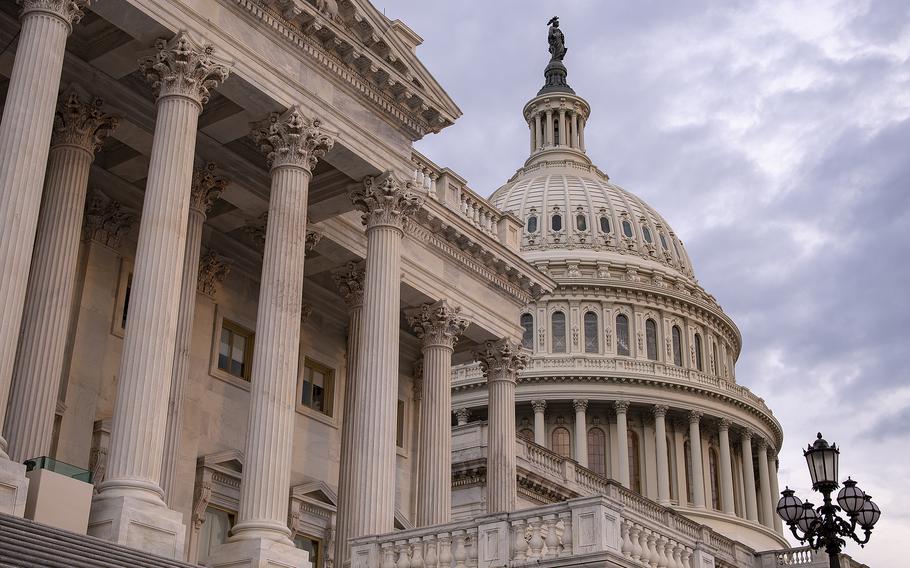
The U.S. Capitol in Washington, D.C., as seen July 6, 2022. (Carlos Bongioanni/Stars and Stripes)
WASHINGTON — Troops are poised to receive pay raises and inflation bonuses, expanded child care, contraception coverage, paid moving expenses for pets and other support under the House version of defense policy legislation for the 2023 fiscal year.
Lawmakers packed their $840 billion National Defense Authorization Act, an annual military spending priorities bill slated to take effect Oct. 1, with a slew of quality-of-life improvements as high costs of living, elevated suicide rates and additional stressors take a toll on service members and their families.
The House on Thursday adopted the mammoth legislation, which typically totals more than 3,000 pages, but it will still need to be reconciled with a Senate version and paid for by a separate bill from congressional appropriators.
A shared provision among all the drafts is a 4.6% pay hike for service members and civilian personnel, the largest in 20 years. House lawmakers also agreed to give additional 2.4% bonuses to troops earning less than $45,000 per year to counter the effects of inflation that rose to 9% last month. The bonus amounts to a maximum of $90 per month and would be paid from January to December 2023.
“I am especially proud that this year’s bill supports those who defend our country by giving them the compensation they deserve,” Armed Services Committee Chairman Adam Smith, D-Wash., said in a statement.
In addition to wage hikes, the bill also provides relief for housing and other everyday costs and covers up to $2,000 in pet moving costs for overseas military moves.
The White House on Tuesday shot down proposed extra pay for sailors working on ships undergoing lengthy overhauls and soldiers in the Arctic due to “sufficient” existing law for special duty pay. But those provisions still made it into the legislation, championed by lawmakers alarmed by suicides tied to Alaskan bases and the USS George Washington.
Other measures targeting suicide prevention, including a six-year pilot program to provide troops with safes, locks or other devices to store their personal firearms, are also attached to the bill.
“We have an obligation to address this extraordinary rate of suicide in the military,” Rep. Jackie Speier, D-Calif., said this week on the House floor. “This is one modest step."
Speier also successfully lobbied to eliminate Tricare insurance co-pays for contraception for one year, giving women service members and their families benefits long available to civilians under the 2010 Affordable Care Act. An effort to expand troop access to abortions at military medical facilities failed to clear the Rules Committee for a floor vote.
Another health care provision put forward by Democrat Andy Kim of New Jersey and Republican Trent Kelly of Mississippi will provide all members of the National Guard and reservists access to the same no-fee dental care as active-duty troops.
"It is our sworn duty as members of Congress to ensure they have access to preventative and continuous dental care -- just as we do for active-duty military personnel," Kelly, a major general in the Mississippi Army National Guard, said last month. "All too often, these men and women have not been able to deploy when needed because of a dental issue."
Several other measures are dedicated to improving access to child care and the quality of military child development centers.
One provision would help families on waitlists for on-base care by paying them up to $400 more per month to afford civilian child care. Another would provide financial support for extended family members who take on child care duties during a move to a different duty station.
Lawmakers also agreed to raise pay and improve benefits at child development centers to attract and retain employees as well as invest in the long-term upkeep of the facilities. The Defense Department would be required to significantly ramp up spending on maintenance during the next four years.
The defense bill additionally forces the Pentagon to build on the military justice reforms enacted in last year’s version of the NDAA and offer stronger support for victims of sexual assault.
Sexual harassment prosecutions would move outside the chain of command under the legislation, giving the cases to independent prosecutors rather than commanders. Lawmakers are also directing the military to establish a compensation fund for victims of violent crimes, including assault and rape, and grant up to $7,500 to victims leaving abusive relationships with a service member.
Congressional work to produce a bicameral 2023 defense bill is not likely to commence until September, the earliest that the Senate is expected to vote on its version of the legislation.
“Our work is not done,” said Rep. Mike Rogers of Alabama, the top Republican on the Armed Services Committee. “We will continue to improve upon this bill in conference to ensure that this legislation gives our warfighters what they need.”